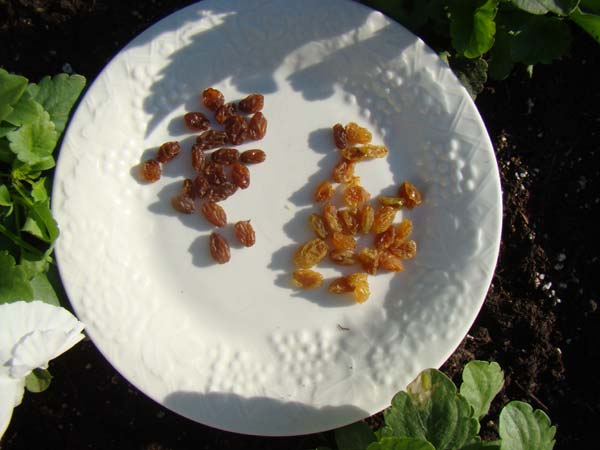
Harvest season. I live in an agricultural area. My small town is surrounded by miles and miles of fields planted in beans, onions, pumpkins, watermelons, and tons and tons of tomatoes (Romas, the kind that are used to make sauce). There are also plenty of orchards filled with cherries, apples, peaches, pomegranates, walnuts, pistachios and almonds, lots and lots of almonds. In fact, some sources suggest that 80% of all the world's almonds are grown right here in the Valley. I know I can't spit in any direction without hitting an almond tree -- almond orchards ring the town, and almond trees are constantly coming up in our garden thanks to the ever-busy bluejays who carry the nuts here and bury them. We also grow lots of grapes. California produces over 90% of the wine grapes in the U.S., and the Central Valley produces more than any other area, although admittedly, we do not produce the best quality grapes. The areas near the coast, like Napa, have the climate that gives them the edge. Still, we produce lots of grapes, and the grapes are used to make lots of excellent wines.
The grapes we grow in our garden are not wine grapes, they are green seedless somethings. They are eatin' grapes. My wife picked up the vine from the discard bin at the nursery where she was working at the time, and she threw it in a pot in the backyard. It not only survived, it flourished. It produces more grapes than we can eat fresh, and people got to the point of avoiding us during harvest season because they didn't want any more grapes. So, it finally dawned on me to make raisins from the abundance. (You can read about that here.)
For my first batch of raisins, I simply plucked them from the vine and put them in the dehydrator. I figured I'd invest as little time as I could in a process that I wasn't sure I'd like. I did, however, like the raisins. So with the next batch, I figured I'd invest a bit more of my time. Everything I read said that if you blanch the grapes before you dried them, you'd get better results. It seems that the blanching process deactivates the enzymes that cause a fruit to darken as it dries, and it also "cracks" the skins of the fruit to facilitate drying.
I thought that blanching was going to be more a hassle than it turned out. I simply picked the grapes, dumped them in small batches into a pan of boiling water for 30 to 60 seconds, and then immediately transferred them to a bowl of ice water to stop the cooking. Soak them in the ice water for about the same time as you had them in the boiling water -- about a minute. Then dry them off and stick them in the dehydrator. As advertised, the blanching did make a significant difference. The raisins turned out to be a beautiful golden color, and sure enough, they were ready in half the time of the unblanched grapes.
Any further experiments with raisins will have to wait until next year as I now have used up all of this year's harvest. I like being able to say that instead of having to feel bad about all the grapes that were left to rot. I may play around with the dehydrator a bit, trying out some fruits that go on sale at the supermarket. My wife planted a fair amount of parsley for the winter garden, so some dried herbs might also be in the offing.
The whole dried-stuff arena is new to me, so please feel free to offer any advice or suggestions that you may have. I want to get my money's worth out of the dehydrator.

The Piker Press moderates all comments.
Click here for the commenting policy.